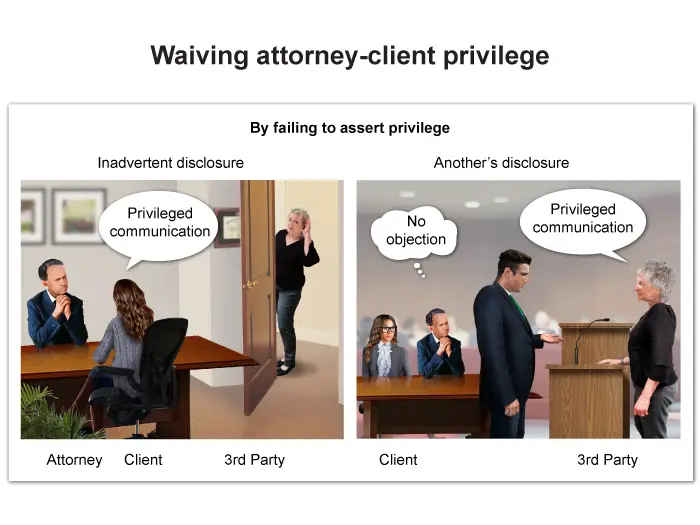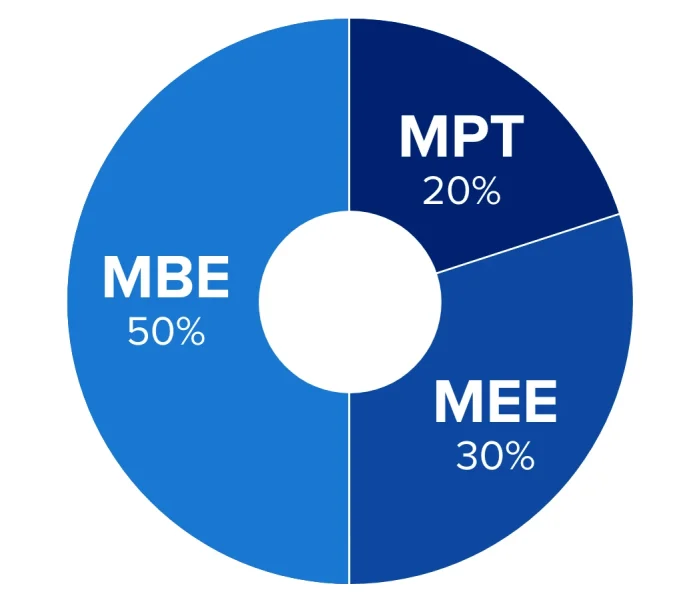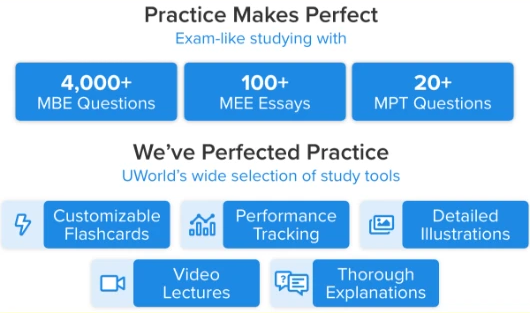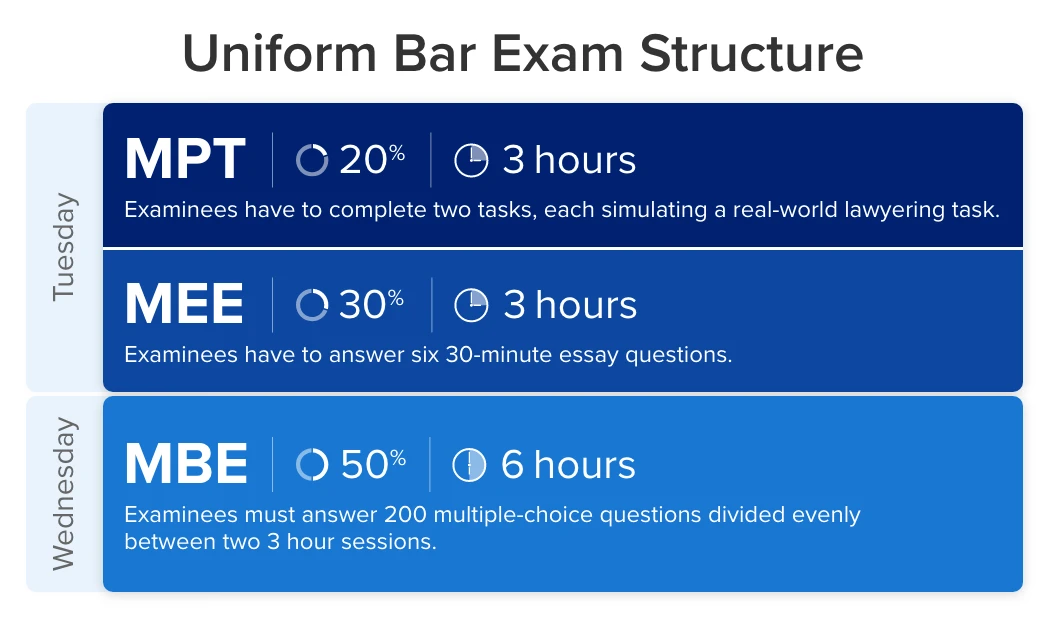The Indiana Bar Exam 2024
Structure, Topics, Dates, Cost, Scores, and Eligibility
The Indiana Bar Exam adopted the Uniform Bar Examination (UBE®) in July 2021. The UBE is divided into three sections—the Multistate Bar Examination (MBE®), the Multistate Performance Test (MPT®), and the Multistate Essay Examination (MEE®). Bar candidates that may want to eventually practice law in another state benefit from score portability between the 41 jurisdictions that have adopted the UBE. This article provides everything you need regarding IN Bar Exam results, dates, deadlines, fees, applications, and more.
Indiana Bar Exam Structure
The Uniform Bar Exam is administered over two days and consists of a writing section (MPT/MEE) and a multiple-choice section (MBE).

Indiana Bar Exam Dates, Requirements, and Scheduling
Avoid late fees that will double the initial fee by submitting your application before the first filing deadline. Be sure to review the important deadlines, dates, and fees below.
Exam Dates
The fee to submit an application to sit for the Indiana Bar Exam doubles after the first filing deadline, so it's important not to procrastinate.
2024 Application Deadlines:
| Filing Periods | February 27-28, 2024 Exam | July 30-31, 2024 Exam | Fee |
|---|---|---|---|
| First Deadline | November 15, 2023 | April 1, 2024 | $250 |
| Final Deadline | November 30, 2023 | April 15, 2024 | $500 |
Examinees can reapply for the Indiana Bar Exam after their original exam appointment. Deadlines are as follows.
2024 Reapplication Deadlines:
| Filing Periods | February 27-28, 2024 Exam | July 30-31, 2024 Exam | Fee |
|---|---|---|---|
| First Deadline | December 15, 2023 | May 30, 2024 | $250 |
| Final Deadline | December 30, 2023 | June 15, 2024 | $500 |
All filing deadlines are valid even if they fall on a weekend. Applications must be completed and all documents must be uploaded by 11:59 pm EDT.
Requirements
The State Supreme Court of Indiana stipulates that applicants must have graduated with a Juris Doctorate (JD) from a law school accredited by the American Bar Association to sit for the IN Bar Exam. The following Indiana law schools are ABA-accredited:
- Indiana University Maurer School of Law (Bloomington)
- Indiana University Robert H. McKinney School of Law (Indianapolis)
- University of Notre Dame Law School
- Valparaiso University School of Law
- Indiana Tech Law School (Provisionally approved)
Note that it is possible to submit an application before graduating from law school if the applicant has less than five hours to complete, has less than one hundred days left until graduation, has passed all relevant subject matter, and has completed all other requirements.
Applicants must also undergo a character and fitness evaluation at least 30 days before the IN bar exam. Details on how to set up this interview are sent following the submission of an application.
Scheduling
To schedule your appointment to take the Indiana Bar Exam, you first must create an account with the Indiana Bar Admission Registration and submit your application and all documents before the final filing deadline. You'll need to input your National Conference of Bar Examiners (NCBE®) number or create an account if you don't have one.

Indiana Bar Exam Cost and Fees
Fees and costs associated with the Indiana Bar Exam vary depending on status and filing date. Below is a detailed and up-to-date list of exam-related fees.
| Application Fees | |
| Timely Filing | $250 |
| Late Filing | $500 |
| Other Application Fees | |
| Admission on Motion | $875 |
| Corporate Counsel not Admitted In-State | $875 |
| UBE Score Transfer | $500 |
| Miscellaneous Fees | |
| Laptop Use Fee | $110 |
Payment Policies
Application filing fees must be paid electronically via MasterCard, Visa, or Electronic (e-check) checks. Contact the Indiana office if these payment methods are not available to you.
Cost-saving options
The application fee for the Indiana Bar Exam is relatively low compared to some other jurisdictions. Regardless, $250 is not a small sum of money. Fortunately, there are cost-saving options available to some candidates. The Indianapolis Bar Foundation awards academic and educational scholarships to law students every year.
The Indiana Continuing Legal Education Forum (ICLEF) also has a scholarship fund to help attorneys fulfill their continuing legal education requirements. Email Marie Wilmer for details.
Indiana Bar Exam Subjects and Topics
The IN bar exam tests an examinee's ability to analyze and reason alongside their knowledge and understanding of fundamental legal principles. Furthermore, since Indiana has adopted the UBE, a successful exam score represents one's competency and readiness to practice law in the 40 other participating jurisdictions.
MBE
The MBE is administered in two 3-hour sessions on Wednesday (Day 2) of the bar exam. It is scored on a 200-point scale and presents candidates with 200 multiple-choice questions. Remember, there are 25 unscored pilot questions for future exams. The remaining 175 questions are divided evenly among the following seven MBE subjects:
- Constitutional Law
- Contracts
- Criminal Law/Procedure
- Evidence
- Civil Procedure
- Real Property
- Torts

MEE
The MEE consists of six essay questions. Each question involves one or more of the subjects listed below. Some subjects may be paired together. Other subjects may be omitted. While it's impossible to know which subjects the NCBE will choose on any given exam version, some have been tested more frequently than others historically.
For example, Civil Procedure has appeared on nearly every MEE in the past decade, while Criminal Law has only appeared several times. However, subjects that occur less frequently on their own may be paired with others.
- Business Associations
- Civil Procedure
- Conflict of Laws
- Constitutional Law
- Contracts
- Criminal Law and Procedure
- Evidence
- Family Law
- Real Property
- Secured Transactions
- Torts
- Trusts and Estates
Check out our MEE Subject Matter Outline for detailed explanations of MEE subjects and sub-topics.
MPT
The MPT consists of closed-universe practical questions with instructions, factual data, cases, statutes, and other reference material supplied by examiners. Candidates will answer two cases presenting simulated real-life scenarios to demonstrate their lawyering skills, using only the materials provided by the bar examiners. Each case is assessed on a 6-point scale, with a 6 being the highest possible score and a 0 being the lowest possible score.
Indiana Bar Exam Scoring/Grading
To be admitted into the Indiana Bar, applicants must pass the UBE with a minimum scaled score of 264 out of 400. Exam weightage is divided between the three sections as follows:

The MEE and MPT are combined into half the weightage of the test and graded as such. Therefore, the writing section (MEE/MPT) and the multiple-choice section (MBE) each comprise 50%, or 200 points, of your total scaled score. If you do poorly on one section of the exam, you can make up for it on the other, as long as these scores combine to a sum of 264 or more.
Note that getting 132 of 200 MPT questions correct does not necessarily mean you've earned 132 scaled points. Scaled scoring is employed to ensure fairness across exam versions. This scoring model is true for all three sections of the bar exam.
For example, July's exam may be more difficult than February's. It would be unfair to allow someone to pass or fail based on the relative difficulty of their exam version. Therefore, examinees' raw scores are transformed into scaled scores through a statistical method called equating. Unfortunately, the NCBE does not release data on the calculations it uses to determine scaled scores.
Indiana MPRE minimum passing score
Before you can practice law in Indiana, you must also pass the Multistate Professional Responsibility Examination (MPRE®) with a minimum score of 80 within two years following or preceding the successful completion of the Indiana Bar Exam. The MPRE features 60 multiple-choice questions administered over two hours.
Check out our article, About the MPRE, to learn more about the mandatory exam.
Indiana Bar Exam Results and Pass Rates
As is typical with bar exams across the country, the Indiana Bar Exam's repeater pass rate is markedly lower than the first-timer pass rate. This phenomenon is likely because many examinees who failed the first time haven't changed their study habits significantly.
| Exam | Overall Pass Rate |
First-Timer Pass Rate |
Repeater Pass Rate |
Results Release Date |
|---|---|---|---|---|
| July 2023 | 70% | 77% | 33% | September 11 |
| Feb. 2023 | 50% | 62% | 42% | April 5 |
Below are the annual pass rates for the Indiana Bar Exam since 2017 divided into first-time examinees and repeaters:
| Exam | First Timers | Repeaters | Overall | |||
|---|---|---|---|---|---|---|
| Year | No Of Candidates |
Pass Rate | No Of Candidates |
Pass Rate | No Of Candidates |
Pass Rate |
| 2022 | 459 | 75% | 150 | 33% | 609 | 64% |
| 2021 | 439 | 76% | 139 | 28% | 578 | 64% |
| 2020 | 461 | 80% | 296 | 50% | 757 | 68% |
| 2019 | 471 | 74% | 226 | 30% | 697 | 60% |
| 2018 | 486 | 73% | 237 | 32% | 723 | 60% |
| 2017 | 531 | 73% | 261 | 38% | 792 | 61% |
Indiana Bar exam results
Indiana Bar Exam results are typically released eight to nine weeks after the bar exam. In 2023, results were released on September 11 for the July exam and April 5 for the February Exam.
What Makes the Indiana Bar Exam Unique?
As for bar exam reciprocity, any practicing attorney who meets the requirements enumerated in the section above can apply for admission to the Indiana Bar Exam. Furthermore, no jurisdiction-specific component is required for admission to the Indiana Bar.
Indiana Bar exam reciprocity
Indiana does not have formal bar exam reciprocity. Instead, they have what is called an Admission on Foreign License, which requires candidates to meet the following criteria regardless of their originating jurisdiction.
- Admitted to practice law in another US jurisdiction
- Actively engaged in the practice of law for at least five of the seven years preceding the application for admission
- Graduated from an ABA-accredited law school
- Meets character and fitness requirements as stipulated by the NCBE
- In good standing in all jurisdictions where admitted to practice law
Indiana Bar Exam for foreigners
Graduates of foreign law schools are not eligible for admission by examination to the Indiana Bar unless they meet very similar requirements to those US attorneys from other US jurisdictions. Foreigners must:
- Be admitted to practice law in a foreign country
- Actively engaged in the practice of law for at least five of the seven years preceding the application for admission
- Meets character and fitness requirements as stipulated by the NCBE
- In good standing in all jurisdictions where admitted to practice law
- Intends to practice as a foreign legal consultant and maintain an office in Indiana
Final Takeaways
The difference between those who fail the Indiana Bar Examination and those who pass is the right study plan. A quality full bar review course will help improve your score, whether it's your first, second, or even third time taking the IN Bar Exam.
Themis + UWorld gets you exam-ready with exam-like practice with content and questions curated by an in-house team of subject matter experts. Our in-depth answer explanations for each answer choice and industry-leading images make the hard stuff easy to understand. Here's an overview of what you'll get:

Contact details of the Indiana State Bar
Refer to the table below to contact The Indiana Supreme Court.
| Indiana Board of Bar Examiners Contact Information | |
|---|---|
| Medium | Info |
| Phone Number | (317) 232-2552 |
| [email protected] | |
| Address | Office of Admissions and Continuing Education 251 N. Illinois Street, Suite 550 Indianapolis, IN 46204 |
